'In his 2014 election campaign, Mr Modi had boasted that he would apply the Gujarat model to the rest of India. We just have to ensure he doesn't start with Parliament,' says Shashi Tharoor in this fascinating excerpt from his new book, The Paradoxical Prime Minister: Narendra Modi And His India.
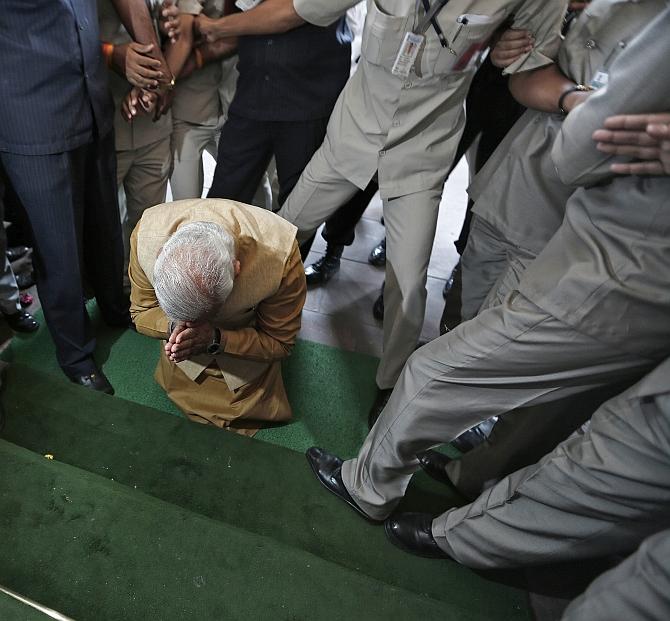
The BJP government's undermining of Parliament is one of the most striking examples of misgovernance apparent in the Modi era.
Under his regime, the government will propose. The Opposition will oppose.
If matters come to a head and a vote is called, the government's brute majority will dispose. The merits of the issue will matter little.
There will be no reasoned attempts to persuade the other side; or rather, when such attempts are made by the well meaning, they will prove futile, since persuasion, reflection and exchange are not the purpose of the exercise.
Increasingly, parliamentary debates have become a ritual, the obligatory airing of opposing views, until the whip is cracked and MPs duly vote on party lines.
Even sensible suggestions by the Opposition -- with which the Treasury benches do not in fact disagree -- are never adopted, since to do so would admit the possibility of flexibility into government legislation in the Lok Sabha.
The only time that Opposition views are taken into account is when the outcome of the vote would otherwise be uncertain -- in the Upper House. And now, as we have seen, even that is changing, as the BJP control of state assemblies gradually assures the government a majority in the Rajya Sabha as well.
But in the Lok Sabha, secure in its overwhelming majority, the government simply chooses not to listen, or to listen with a closed mind. The idea of Parliament as a forum for collective deliberation and agreed outcomes has ceased to have any meaning.
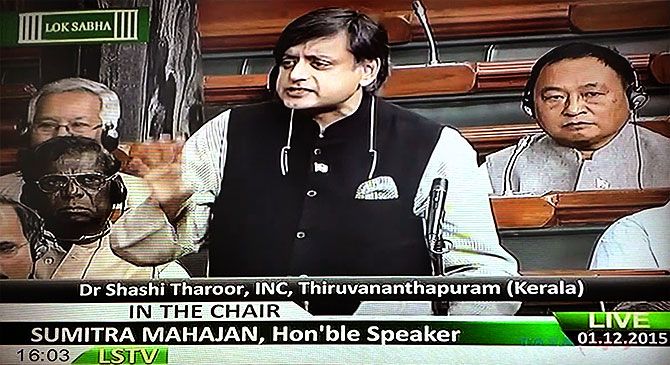
I had a taste of this myself in 2017's monsoon session, on a routine and non-controversial Bill on labour rights, which my party (having initiated the reform itself in the UPA days) had agreed to support. The Bill merely required that employees in companies of a certain size had the right to be notified of their rights, in writing.
During its passage, I suggested that, given that nearly a fifth of Indian men, and more than a third of Indian women, were illiterate, two words should be added: 'Orally and in writing'.
My logic, as I explained to my fellow MPs, was that while the Bill's objectives were laudable -- in giving labourers knowledge of their rights in writing, so they could be legally enforceable -- the substance of those rights should also be conveyed orally, so that illiterate workers could understand what they were entitled to.
This suggestion was entirely within the spirit of the Bill. I saw several BJP MPs nodding their heads affirmatively at this common-sense suggestion. But when the amendment was put to a voice-vote, the ruling party erupted raucously in a vociferous chorus of 'No'.
My proposal was negatived. The whip was to vote in a certain way -- common sense be damned.
This is a small example of how little real give-and-take there is in our parliamentary system, especially when the government in power rules by brute majority.
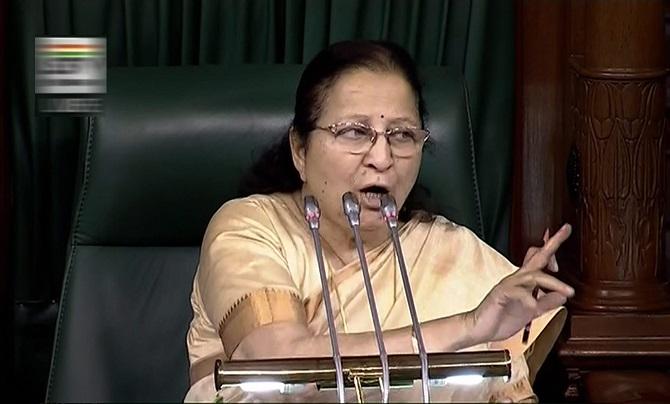
Enabling such an authoritarian way of conducting itself is the Anti-Defection Law, 1985, which inaugurated a practice of party whips on all issues, making receptivity to the ideas of the other side punishable with expulsion from the House.
There was nothing about my idea that need have upset the ruling party or that went against its ideological interests or the substantive purposes of the Bill. But the debate that was scheduled on the Bill was never intended to influence the terms of its adoption.
It was just a ritual. The outcome was preordained: The Bill would be passed without change.
What, one might ask, is the point of such debates at all, other than to nail one's colours to the party mast?
Why should a serious MP exercise his grey cells to come up with constructive suggestions, if they are never going to be considered, let alone adopted? This was not how it was meant to be.
What is our conception of what Prime Minister Modi has called 'the temple of democracy'?
Is it merely a place to ratify decisions made elsewhere in party cabals or Cabinet meetings, whose adoption is rendered inevitable by the previous general election results?
Or is it a chamber where the representatives of the Indian people assemble to express their considered opinions and thoughtful disagreements, before coming to an outcome in the interests not of a party but of the country as a whole?
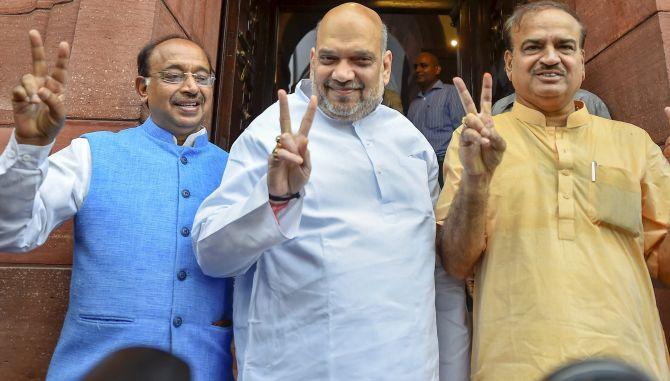
The Anti-Defection Law was passed with good intentions -- the same good intentions with which, the proverb tells us, the road to hell is paved.
It was intended to stop the aaya Ram-gaya Ram practice of legislators crossing the floor in pursuit of power and pelf, which saw state governments (and two central governments) between 1967 and 1985 rise and fall like skittles.
The idea was noble, and rested on sound principles: Governmental stability matters; people must stay loyal to the party on whose platform they contested; the intent of the voters must not be betrayed by defections.
When the law was first explained by its proponents, there was widespread support, even enthusiasm, for its passage. But how has the Act worked in practice? It has dramatically reduced defections, but not eliminated them, as we have seen in Uttarakhand in 2017 and Manipur, Gujarat and UP in 2018.
What it has done most effectively is to stifle the voice of the individual legislator. Since every single vote in Parliament sees a whip being issued -- however trivial the subject of the Bill -- there is no room for honest differences of opinion.
Disobeying a whip offers grounds not just for disciplinary action by the party, but expulsion from Parliament altogether.
No MP who has struggled and strived (and spent) to get elected to his seat lightly places it in jeopardy. His convictions become secondary to the party line.
The 'argumentative Indian' is often on display in both Houses, but only when he is arguing strictly according to his party's position.
As a result, the Anti-Defection Law has reduced each MP to a cipher during every vote, a number to be totted up by his party whip rather than an individual of ability, conviction and conscience.
This outcome has other effects: It reduces the need for each MP to study an issue thoroughly and come to a position on it, since his position no longer matters unless he is part of the party leadership.
In my experience, most MPs only study the Bills they are assigned to speak on; the rest sees them dutifully voting as their whip tells them to. This is, in many ways, a travesty of the parliamentary process.
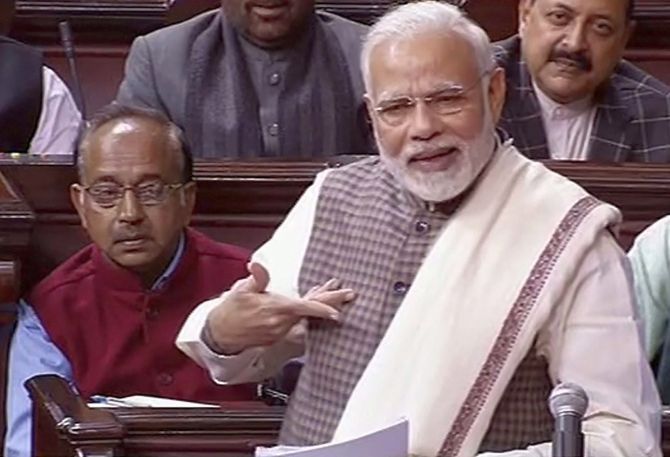
Prime Minister Modi occasionally shows up to deliver rodomontade speeches in Parliament, but he does not take questions, and has refused to subject himself to any kind of parliamentary cross-examination of his policies or statements.
In the process, the 'temple of our democracy' has been devalued to little more than its proscenium stage, with ministers and MPs little more than sacerdotes hovering around with ritual offerings for the head priest.
Whereas in the early days a prime minister could even be challenged by MPs from his own party -- think of Jawaharlal Nehru being attacked by Feroze Gandhi, Finance Minister T T Krishnamachari being forced to resign by his own backbenchers, or Mahadev Mishra challenging his prime minister's China policy -- today conformity, even unquestioning obedience, rules the roost.
So why give Parliament an importance its performance does not warrant?
The result of this kind of thinking is apparent. The first three Lok Sabhas saw as many 140 sittings a year; we are now at about half that number, and it is reducing every year, since the BJP government clearly has very little time for the distractions of Parliament.
In the 15th Lok Sabha, 25 per cent of the Bills were passed with scarcely any discussion at all and only 20 per cent witnessed discussions of three hours or more.
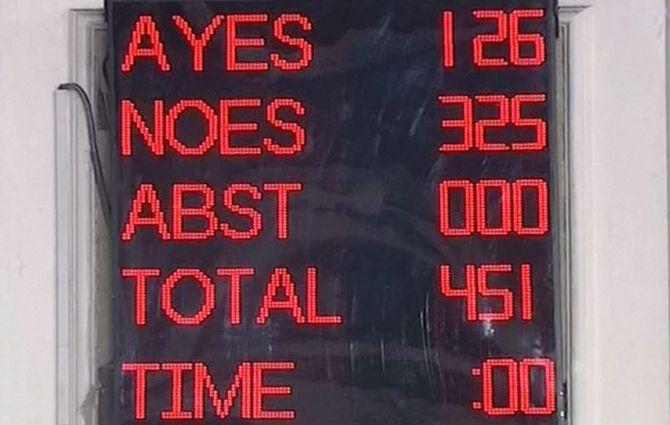
These figures are almost certainly lower in the current 16th Lok Sabha, which has met only for a grand total of 287 days over a span of four years. In the Modi-era Lok Sabha, only 26 per cent of the Bills introduced have been referred to committees.
Barely 15 per cent of the Union Budget is discussed in detail; our government is spending taxpayers' money without the taxpayers' representatives having a meaningful say in how it is spent.
Once Bills are passed in a hurry, they become Acts, and Acts are implemented through the promulgation of Rules, which are drafted by the government and supposed to be placed on the table of each House.
The Rules really govern how the Act works in practice, and in theory are subject to parliamentary scrutiny. Guess how many Rules have been discussed in the current Lok Sabha? Precisely zero.
Such practices are destroying the role of the Indian parliamentarian as the legislator he was envisaged to be by our founding fathers in the Constitution.
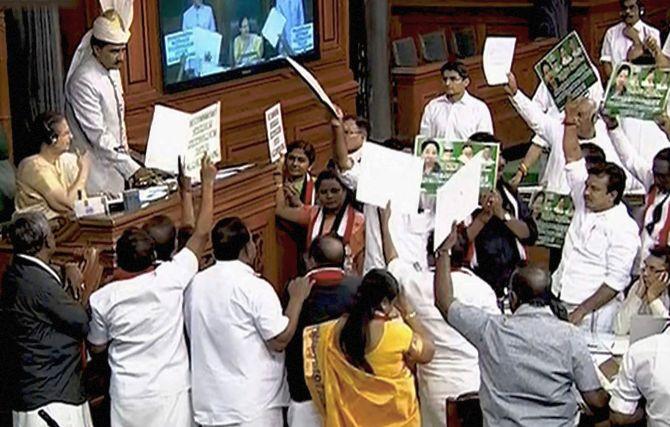
The other aspect of the functioning of Parliament today that deserves to be reiterated here is parliamentary disruption, which has become a frequent and ubiquitous feature of our democracy in the Modi era.
I am a conscientious objector to parliamentary disruptions. Sadly, my belief that Parliament is a place where the elected representatives of the people work uninterruptedly for the benefit of the people, doesn't seem to be shared by too many of my fellow parliamentarians.
More than 60 per cent of the time of the previous Lok Sabha was lost to BJP-led disruptions. It was hardly surprising that -- faced with the stubborn refusal of the government to accept that the conduct of their external affairs minister and two chief ministers warranted their resignations or at least a serious investigation -- the UPA members decided to emulate their predecessors in Opposition.
Those of us who attended missionary schools learned the golden rule: 'Do unto others as you would have them do unto you'. The new golden rule of Indian politics has become: 'Do unto others what they did unto you'.
In a startling turnaround, the poachers have now become the gamekeepers.
The very politicians who had argued the case for disruption -- who had used sophistry and morality to obstruct the work of Parliament for years in the cause of the higher principle of accountability -- suddenly decided that on this issue, where you stand depends on where you sit.
Now that they are sitting on the Treasury benches, disruption is wasteful, even anti-national.
I am sorry, but it won't wash. Of course, two wrongs don't make a right.
But it was the BJP who had set the standards of parliamentary conduct they are now deploring.
It was they who had declared 'resignations first, discussions later'.
Well before I entered politics, I had been invited by then Speaker Somnath Chatterjee to a round table of eminent citizens (Narayana Murthy and Shyam Benegal among them) to discuss the functioning of Parliament.
We had all called for strict enforcement of the rules to ensure higher standards of decorum and debate, and been disabused by the Speaker of our illusions.
Disruptions, he said, occurred because an outnumbered Opposition saw them as part of their democratic rights; to thwart them by invoking the rule book would be condemned by all parties, including the ruling Congress, as undemocratic.
So suspending, let alone expelling, MPs was not an option he could easily exercise.
Matters got worse under the next Speaker, Meira Kumar, whose decency and gentility were shamefully abused by a belligerent BJP.
Still, she echoed the Somnath Chatterjee line: It would be wrong to expel unruly Opposition members without an all-party consensus on doing so.
So disruption continued.
Whatever the merits of this method of parliamentary protest -- and personally, it is not something I have ever cared for -- it has become part of the convention of Indian parliamentary practice.
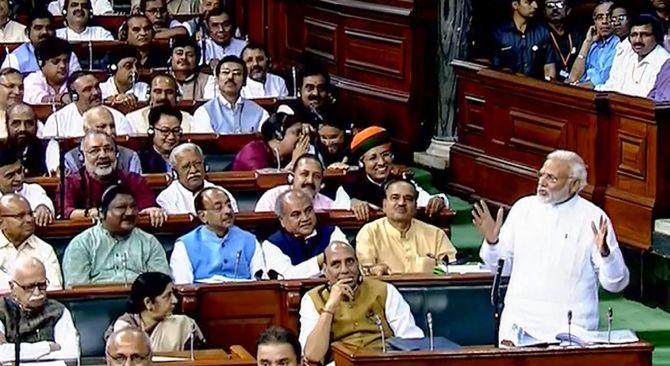
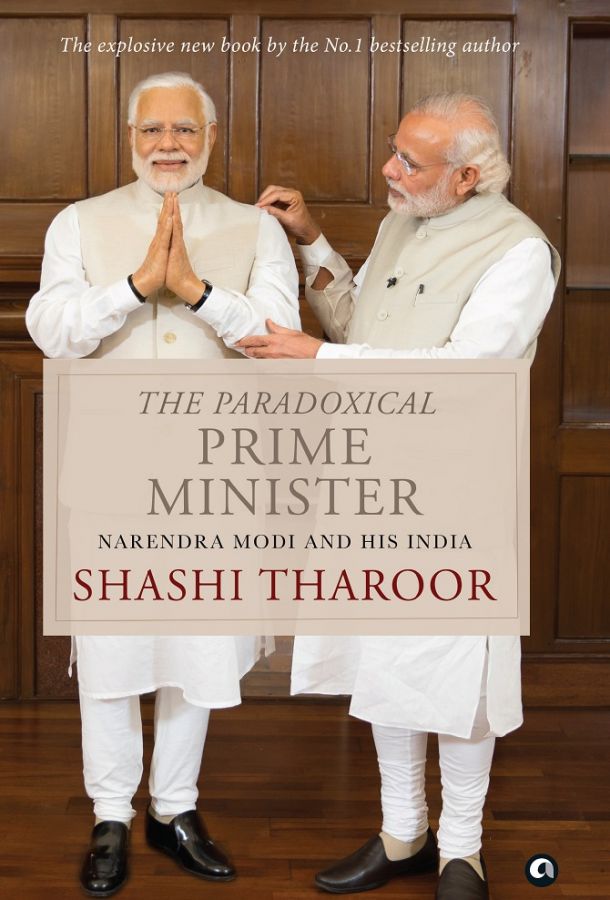
So the shock when Speaker Sumitra Mahajan expelled 25 of the Congress's 44 members for five days in 2015, invoking Rule 374A, which had only been used three times in the entire 67-year history of independent India (at the time), was palpable.
Seven Opposition parties announced they were joining the Congress in boycotting the Lok Sabha in protest against this deplorable decision.
Certainly, let us create new standards of acceptable parliamentary conduct, but by consensus with all parties.
Expelling your Opposition is not democracy.
But Mr Modi knows that: He has done exactly the same thing, repeatedly, in the Gujarat Assembly, passing laws with almost the entire Opposition suspended from the House.
In his 2014 election campaign, Mr Modi had boasted that he would apply the Gujarat model to the rest of India.
We just have to ensure he doesn't start with Parliament.
Excerpted from The Paradoxical Prime Minister: Narendra Modi And His India by Shashi Tharoor, with the kind permission of the publishers, Aleph.


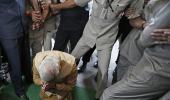









 © 2025
© 2025